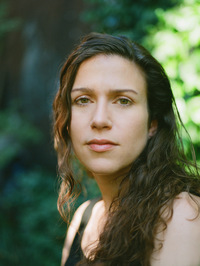 Back in February, we didn’t know how lucky we were to have Paris Review editor Emily Nemens appearing here at the Wellstone Center in the Redwoods for an Author Talk event along with Molly Knight, sharp cultural critic and author of The Best Team Money Can Buy. That was February 22, 2020, three weeks before Northern California — and Santa Cruz — led the nation on “shelter in place.” We had a lively discussion that ranged far and wide but kept coming back to Emily’s debut novel, The Cactus League, a baseball novel like no other, a group portrait of a diverse cast of characters in Arizona for spring training. Now gatherings like that feel as removed as writing newspaper articles on typewriters. And the pandemic put the brakes on Nemens’ book tour, as it put the brakes on so much else, but at least The New York Times featured her and her book in a March 18 article Without Places to Gather, Debut Novelists Reimagine Book Promotion.
Back in February, we didn’t know how lucky we were to have Paris Review editor Emily Nemens appearing here at the Wellstone Center in the Redwoods for an Author Talk event along with Molly Knight, sharp cultural critic and author of The Best Team Money Can Buy. That was February 22, 2020, three weeks before Northern California — and Santa Cruz — led the nation on “shelter in place.” We had a lively discussion that ranged far and wide but kept coming back to Emily’s debut novel, The Cactus League, a baseball novel like no other, a group portrait of a diverse cast of characters in Arizona for spring training. Now gatherings like that feel as removed as writing newspaper articles on typewriters. And the pandemic put the brakes on Nemens’ book tour, as it put the brakes on so much else, but at least The New York Times featured her and her book in a March 18 article Without Places to Gather, Debut Novelists Reimagine Book Promotion.
“I was fortunate to complete the first half of my tour in February — though I was in several Covid-19 hot spots, including Seattle, just days before the outbreak was detected there, and those happy, carefree — and crowded — gatherings now seem a bit ominous,” Nemens told the Times. “I had a second leg charted — visiting spring training and the Tucson Book Festival, then speaking to several university writing programs, including my graduate alma mater, Louisiana State University. I was supposed to be watching a Brewers spring training game right now!”
She focused on podcasts and social media and other ways to get out the word on her book – all while furiously working on the Paris Review. Tyler Cabot of The Chronicles of Now, a brilliant project to pull fiction from the headlines, reached out and asked Nemens to tap into her novel for a COVID-era extension of the world of her novel.
“We commission authors to write short fiction inspired by the news as a way of understanding the headlines from a more human perspective and pushing people to consider stories in a new way and hopefully want to read more deeply about them,” Cabot said in an interview. “The whole purpose of the site is to make fiction more timely and more of the moment. I actually grew up in Arizona going to the Cactus League. As soon as I saw the news about baseball moving the whole league to Arizona, it was so obvious: It would be amazing to have Emily imagine what that would look like.”
That led to “The Arizona Plan: Major League Baseball Heads to the Desert,” a deliriously enjoyable fictional riff on the likelihood of regular-season baseball taking place later in 2020 in Arizona.
“For all of MLB to play in Arizona, every stadium—and I’m talking major and minor spring-training camps, plus the D’backs stadium, plus the ASU field, and I heard they were even looking at a goddamn high school park—would be pulling doubleheaders, seven days a week,” a character rants. “Which meant half the time we’d be playing in 100-degree heat. Plus. Forget the virus, I was going to lose my guys to heatstroke.”
Back in February, the Times gave The Cactus League a warm review – “A Winning Baseball Novel” — written by none other than Chip McGrath, former Editor of The New York Times Book Review. “Nemens really does have a long view — or, better, a wide one — and in The Cactus League she provides her readers with what amounts to a miniature, self-enclosed world that is funny and poignant and lovingly observed,” McGrath gushed.
After that the review turned a little weird. “Just how she comes by her baseball savvy is a bit of a mystery,” McGrath wrote. “This is her first book (it began as an M.F.A. thesis), and Nemens, who is also an accomplished artist and illustrator and former jazz musician, has spent most of her career not in sports management or in a team’s front office somewhere, but working for literary quarterlies.”
This is funny, but not intentionally so. To write a baseball novel one should first work in a team’s front office? That’s a howler! I’m sure a lot of baseball managers also write wonderful poetry, possibly even haiku.
What’s great about Nemens’ novel is it has the confidence and sense of purpose to tell its stories with zero interest in any self-professed gate keepers of baseball knowledge. It knows what it knows and doesn’t look over its shoulder.
As Kate Tuttle noted in a Los Angeles Times review, Nemens “demonstrates deep knowledge not only of baseball but also of American desperation. … (T)here are few happy relationships in The Cactus League. The men are unreliable, egocentric and prone to addiction, the women nakedly motivated by greed and vanity. Yet Nemens makes us care about even the worst of them, a neat trick of unsentimental empathy and a testament to the power of careful, almost loving, observation.”
“In a lot of ways, baseball players are like other men,” a woman in Nemens’ novel muses. “Some of them are dummies, some of them are mad, some of them are suspicious, shallow, arrogant. … But the difference separating ballplayers from everyone else is that they care about something tremendously and have since they were little. It’s thrilling. … Most people will never touch that kind of drive.”
Nemens has shown that kind of drive, and that kind of focus, in numerous realms. It’s funny that someone like McGrath doesn’t seem to grasp that true insight into baseball means true insight into people, a point that McGrath’s good friend Roger Angell – due to turn 100 later this year – has brought home for years in his work.
To help get the word out on a novel we highly recommend, we’re continuing with an email interview we started with Nemens earlier this year, before the pandemic. We checked in with her as the nation erupted in protest over the horrible murder of George Floyd, a seminal moment.
The Wellstone Center in the Redwoods: You’re in New York, have you been to any of the protests in the wake of the Floyd murder?
Emily Nemens: The murder of George Floyd was tragic, but it also is the latest example of a huge, ongoing problem in America: police brutality and systemic racism. This is a moment of national mourning, but may these past weeks of protest and reckoning mean the country is on its way to being a more just and equitable place. I live in the East Village, so the protests are not just worldwide, they are very local. I’ve been to some, but also recognize that between Covid and other constraints, direct action and protests are not the only way to effect change and participate. There are many ways to be a change agent—for white people, I think this is a moment to question your assumptions, identify ways in which white privilege has positively impacted your life, and do more to build equitable systems every day. For all of us, it’s a chance to look at our civic institutions, recognize their historic and current inequalities, and challenge them to do better.
WCR: Your author tour for “The Cactus League” was cut short by events. That had to be a hard adjustment.
Nemens: I feel really fortunate that I was able to do the first half of my tour and that my events were, by and large, really well attended and the book enthusiastically received by readers. Nothing feels quite as good as selling out a bookstore! But I was bummed to lose the second half of tour, both because of the effort that went into booking them, on my part and my publicist’s (it was a particularly complicated dance, given my day job), and because the schedule was built around communities I know and care about. I’m sad I don’t get to share this book with them, at least not for the time being. I’m lucky that the book got great reviews and had some strong sales, but there’s also the “What if?”—Could I have gotten even more momentum around the novel if I was still out on the road?
WCR: As a novelist, do you find your writerly imagination springing into action because of the times we’re living through? Life as an unfolding dystopian novel?
Nemens: To be honest, I’m more of a slow-burn writer, so I haven’t been struck by any brilliant new novel ideas in response to the pandemic. After all, my book about the recession came out in 2020! Though I have been thinking about how my book, which is set in 2011 and addresses the impact of the market collapse in 2008, feels uncannily relevant today, as we’re heading into another national economic crisis. I wish it didn’t. That being said, I put aside my discomfort with “fast-response” writing for the Chronicles of Now piece. I wasn’t sure I could do it, but one, it was so short, and two, I really want to support this new platform. And once I started thinking about it, the whole scenario zoomed together like someone else was doing the driving.
Nemens: I have seen people talking about literature, reading novels at home, and amplifying new books on social media, all of which is welcome. We can only watch the news so many hours a day!
WCR: Going back to how you became a writer, who was the first writer you fell totally in love with?
Nemens: When I was an undergrad, I spent six months in Madrid and went through a huge Hemingway kick. I remember traveling through Spain, seeing these places Hemingway described in For Whom the Bell Tolls, and being bowled over by the resonance between page and landscape. I’m not as in love with Hemingway now as I was then, but the guy can write a sentence. And the possibilities of place in literature–understanding how language can transport a reader, and how, with economy, you can capture a location and a moment in time–that has stuck with me. (Hemingway on “The Art of the Short Story,” from the Paris Review.)
WCR: What were your earliest experiences of baseball? Did your early fandom have to do with sharing baseball with others? Any funny misconceptions you remember having, young, about baseball?
Nemens: My mom grew up in Omaha, so there is a good photo of me in the stands of the Omaha Royals with my grandpa Rich. And I grew up in Seattle, so I started going to M’s games with my dad when I was five or six–I’m not quite sure the year, but my first real memories of the Mariners were Ken Griffey Jr. The best swing in baseball, that guy! He was such fun to watch. I was there when he had that eight-game home run streak, and there when he broke his wrist in 1995. I once saw Jay Buhner make an unassisted triple play–that was wild. As for misconceptions: I was terrified, absolutely frightened, by Randy Johnson. I think most hitters were, too, but imagine being seven and staring up at him, snarling and nearly seven feet high.
WCR: Plenty of sportswriters were terrified by Randy Johnson, especially talking to him up close, though he’s actually low key and funny, once you get past that. Do you read much sportswriting, or books on baseball?
Nemens: When I embarked on this, I spent a year reading almost exclusively sports-related literature. It was a pretty even split between fiction about sports and nonfiction, essay anthologies (the New Yorker‘s sportswriting anthology, The Only Game in Town, edited by David Remnick, was something of a bible), autobiographies, histories of teams and seasons. At that point I had no idea my narrator would be an out-of-work sportswriter, but I’ve always admired how some of the best storytellers are longform journalists, and I wanted my book to have the authentic details of reportage, counterbalanced with narrative. Since then I’ve had to be more well-rounded in my book selections because of the day job, and have been leaning back into more blanket literary fiction, but I still make time to sneak in some longform (I loved Nick Paumgarten’s piece on the Masters) and try to follow the big developments inthe offseason. I usually focus back in on the season around September 1– those last few weeks of the regular season and postseason play, I’m watching and reading with a new urgency. That’s in a normal year.
 WCR: Are you still painting watercolors of women in Congress?
WCR: Are you still painting watercolors of women in Congress?
Archive
The WCR Interview No. 1 – Madison Smartt Bell – July 2015
The WCR Interview No. 2 – Ruth Galm – September 2015
The WCR Interview No. 3 – Deborah Treisman – January 2016
The WCR Interview No. 4 – Matt Gallagher – February 2016
The WCR Interview No. 5 – Viet Nguyen – March 2017
The WCR Interview No. 6 — Tim Denevi — April 2019

